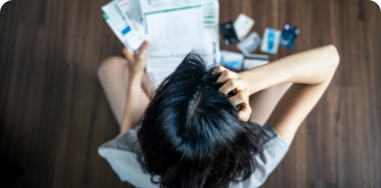Personal bankruptcy in British Columbia serves as a legal insolvency process, offering individuals overwhelmed by unaffordable debt the chance of financial relief.
In this article, we explore bankruptcy in British Columbia, including its definition, how the process works within the province, and the implications when you file personal bankruptcy. We’ll also shed light on the alternative debt relief options available to people living in BC who are grappling with debts they can’t afford.
What is bankruptcy?
Bankruptcy is a legal process designed to provide individuals with a fresh start when they are unable to repay their debts.When someone declares bankruptcy, their financial obligations are legally eliminated, relieving them of the responsibility to repay their creditors. The process is governed by the Bankruptcy and Insolvency Act in Canada.
Bankruptcy and Insolvency Act
The Bankruptcy and Insolvency Act is a federal law that outlines the rules and procedures for bankruptcy in Canada. It provides a framework for individuals seeking debt relief through bankruptcy, ensuring a fair and orderly process.The Act addresses various aspects, including the eligibility criteria, the role of Licensed Insolvency Trustees, the distribution of assets, and the requirements for completing bankruptcy, from monthly payments to surplus income.
How does bankruptcy work?
There is a structured bankruptcy process to help individuals overcome insurmountable debt. Here are the key steps involved:Discuss with a Licensed Insolvency Trustee (LIT)
First, you’ll need to consult with a Licensed Insolvency Trustee (LIT). Licensed Insolvency Trustees are financial professionals who will assess your financial situation, discuss the viability of bankruptcy as an option, and will administer the process if you choose to move forward. There is no cost to consult with a LIT.
Apply for bankruptcy
If bankruptcy is deemed the appropriate course of action, your LIT will work with you to complete the necessary paperwork that is required for you to file a bankruptcy.
File for bankruptcy via your bankruptcy trustee
Next, your Licensed Insolvency Trustee will file the necessary documents with the Office of the Superintendent of Bankruptcy, initiating the legal process.Notify creditors
Your bankruptcy trustee will notify your creditors of your bankruptcy filing. After receiving this notification, your creditors must stop contacting you directly regarding payment, and cease all other collection activities. The bankruptcy also stops any legal action against you.Make bankruptcy payments
If your household income exceeds a certain threshold, you may be required to make surplus income payments to your bankruptcy trustee, who will then share money among your creditors. The amount is determined based on your unique financial circumstances.Attend credit counselling sessions
You are obliged to attend two financial counselling sessions as part of the bankruptcy process. These mandatory sessions are designed to enhance your financial literacy, provide guidance on money management, and help you rebuild your credit.
Discharge from bankruptcy
Upon fulfilling all bankruptcy obligations, such as completing payments and attending credit/financial counselling, you will receive a discharge from bankruptcy. This marks the end of your bankruptcy and the elimination of the discharged debts.
It is essential to work closely with a Licensed Insolvency Trustee while filing personal bankruptcy, to ensure compliance with the necessary steps and requirements.
Is personal bankruptcy the right solution for me?
To be eligible for personal bankruptcy in British Columbia, certain criteria must be met:Residency: You must be a resident of British Columbia or have a significant connection to the province, such as owning property or operating a business there.
Insolvency: You must be unable to pay your debts as they become due, indicating that your liabilities surpass your assets and you are experiencing financial hardship.
Minimum Debt Threshold: You must owe at least $1,000 in order to file for bankruptcy in British Columbia. Whether you owe a small or significant amount, bankruptcy can be an option if you are unable to repay your debts.
It is crucial to consult with a Licensed Insolvency Trustee to assess your eligibility for personal bankruptcy and determine if it is the most suitable solution for your financial circumstances.
What kind of debts will bankruptcy help me with?
Bankruptcy provides relief for a range of unsecured debts, including credit card debt, personal loan payments, lines of credit, and taxes.These debts, along with other unsecured obligations, like payday loans, can be discharged through the bankruptcy process.
It’s important to note that secured debts, such as mortgages and car loans, are generally ineligible for discharge unless you choose to surrender the associated collateral.
If you’re considering bankruptcy, consulting with a Licensed Insolvency Trustee will help determine which of your unsecured debts can be included and provide guidance on the implications for your financial obligations.
Will filing bankruptcy hurt my credit rating?
When you declare bankruptcy, it will be noted on your credit report and can stay on your report for several years. The exact duration can vary depending on the credit reporting agency and the specific laws in your jurisdiction.Having a bankruptcy record on your credit report can severely lower your credit score, making it challenging to obtain new credit or loans in the future. It signals to lenders that you have a history of financial difficulties and may be considered a higher credit risk.
However, it’s important to remember that bankruptcy is often pursued as a last resort when other debt relief options have been exhausted. Despite the negative impact on your credit, bankruptcy provides an opportunity for a fresh financial start and the chance to rebuild your credit over time through responsible financial management and credit rebuilding strategies.
What other debt solutions are available to me in British Columbia?
If you’re looking to avoid bankruptcy in BC, several alternative debt solutions are available depending on your circumstances:Debt consolidation
This involves combining multiple debts into a single loan or line of credit with a lower interest rate. It simplifies repayment by consolidating debts into one monthly payment, and can save you money on your total repayment.Credit counselling
Credit counsellors provide guidance on managing debt payments, budgeting, and improving financial literacy. They can help you create a plan to repay your debts and negotiate with creditors to establish more manageable payment terms.Consumer proposal
One of the most popular alternatives to declaring bankruptcy is a consumer proposal; a formal arrangement negotiated with your creditors through a Licensed Insolvency Trustee.A consumer proposal allows you to repay a portion of your debts over an extended period, usually with reduced interest charges and affordable monthly payments, and even write off up to 70 or 85% percent of your total debt.
Where can I get help dealing with my unsecured debts?
If you’re searching for a fresh start and the chance to rebuild your finances through responsible financial management, A. Fisher & Associates can help.As Licensed Insolvency Trustees with more than 70 years’ combined experience, we have an in-depth knowledge of the debt relief options available in Canada, and can ensure you choose the one that’s right for you.
Don’t let debt take over your life. Take the first step towards a debt-free life by contacting A. Fisher & Associates today.



